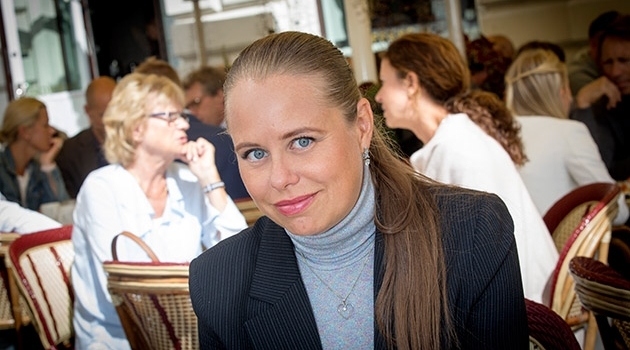What is a citizen?
What is it that determines who is a citizen and who is not? The answer is that in many cases it is somewhat arbitrary, which can have major consequences for democracy, according to Patricia Mindus, Senior Lecturer in Practical Philosophy.
She is leading the new interdisciplinary project Exploring Citizenship, which is a collaborative arrangement between lawyers, political scientists, philosophers and theologians at Uppsala University. With her colleagues Anna-Sara Lind, Jonas Hultin Rosenberg and Johan Wejryd, she will conduct research on voting rights, a highly topical issue today when the number of people moving across borders is growing while political decisions are affecting many people outside territorially delimited states. This poses new challenges to both democratic thinking and the foundations of the rule of law.
“Citizenship is after all the very bedrock of a democracy. It concerns the right to vote, but also participation in the democratic dialogue between elections. There is an asymmetry here: there are non-citizens who in various ways are involved in society and there are citizens who are not, who might have moved long ago. When states decide who becomes a citizen, it can be very arbitrary from a democratic perspective.”
The rules on citizenship vary widely between different countries and over time. From the 1980s and onward, many changes have occurred without it evoking much political discussion, according to Patricia Mindus.
“The rules on citizenship are of a constitutional nature, since they have an effect on the state’s constitutional identity. The form of government of a state, whether it is a democracy or not, depends on who qualifies as a citizen. In spite of this, the interpretation of citizenship rules is often entrusted to grass-roots bureaucrats in the public administration.”
For Patricia Mindus, the project is a spin-off of her research as a Wallenberg Academy Fellow. She already leads a research team that is investigating discretion and arbitrariness in migration policies in the EU.
“It’s fascinating to investigate why we exclude people from political citizenship. There are exceptions, but generally, you cannot vote if you are not a citizen of a country. Why is this the case?”
There are other groups that do not have the right to vote – such as minors or those who lack full legal capacity – but they are exceptions, justified departures from the rule of universal suffrage.
“When it comes to non-citizens, the system is designed in the opposite way. Then the baseline assumption is that they shall not vote. This is a very different situation,” says Patricia Mindus.
Her interest in these issues arose during her ten years as a researcher in Turin, Italy, where she specialised in democracy theory, working alongside Professor Norberto Bobbio. She has developed the functional theory of citizenship according to which what a citizen is determines who should have citizenship.
“An example is European citizenship, which entitles a person to vote in European Parliament elections. If EU citizenship entitles a person to vote in EU elections, how reasonable is it that the EU cannot decide who counts as an EU citizen? The criterion for becoming a European citizen is citizenship of a Member State, which is something the Member States have a pretty free hand with. Some sell national citizenship; others deny it to certain groups. The citizens of the Faeroe Islands, for example, are Danes, but not EU citizens. They have a different passport and different rights. When it comes to European citizenship, it can be shown pretty clearly that there is an imbalance between who is a citizen and what citizenship consists of,” says Patricia Mindus.
In this way, the functional theory of citizenship offers interesting solutions to a number of concrete problems. She recently applied the theory to explain what will happen with EU citizens after the UK’s exit from the EU. Her most recent book is European Citizenship after Brexit (Palgrave, available in open access) where she defends democratic ways to protect political rights, among other things.
“Philosophy contributes creative solutions to public debate,” says Patricia Mindus, who is happy that her book has paved the way for two citizenship initiatives at EU level.
The book was frequently cited this summer in the European Parliament’s analysis of the negotiations with the UK.
“I hope to put legal philosophy back on the map, not least in Uppsala, and I believe that we are well on the way to succeeding in this.”
She is alluding to the heritage from Axel Hägerström and Scandinavian legal realism, which was the topic of her first book. The ‘Uppsala School’ is known internationally and lives on at various universities.
“There are many legal realist school formations today, with a very large footprint in the Latin world. It’s mostly only at home that it’s thought of as a historical phenomenon, but it’s a major tradition that is associated with Uppsala.”
Facts:
Axel Hägerström lived 1876–1939 and was Professor of Practical Philosophy in Uppsala, best known for value nihilism. He was also a sophisticated legal theorist and source of inspiration for Scandinavian legal realism.
Norberto Bobbio was one of the 20th century’s foremost democracy theorists, and also a prominent legal philosopher. He believed that the protection of human rights, democracy and peace are parts of the same philosophical system of values.
Read more:
The Exploring Citizenship project
The research project on discretion and arbitrariness in migration policies
Annica Hulth

